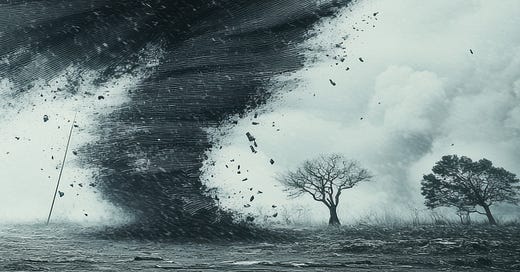Thank you from my heart for trusting me with your attention. I don’t take it lightly, and do my best to put worthwhile pieces in your inbox. As a reader-supported publication, each paid subscriber tangibly helps get this fledgling Folkweaver project off the ground, for which I’m so grateful. Paid subscribers have access to the full archives, and paywalled pieces like this one. If you’re able, please consider supporting this work. And if not, that’s 100% okay—reach out if you need free access to this piece and I’ll give you access, no questions asked.
Psst—some news! Pre-orders for our Spring Equinox Zine: Sowing Seeds of Creativity are up, and I can’t wait to hear what you think of Lesley’s epic covers. If you feel inspired by the theme and want to submit a recipe, poem, or prompt, please email your idea!
We are officially, once again, living through the chaos presidency. We’re only eight days in, and whew—the chaos levels are already so unreal. Annex Greenland? Invade Canada? Rename the Gulf of Mexico to the Gulf of America? Chaos!
The chaos is by design. The tactic is to say outlandish things that are likely not actually on the table, waste hours of our time and emotional capacity in the whipsaw of algorithmic virality and news cycles, and, in the midst of that whirlwind, drop equally outlandish but actually-on-the-table dangerous and harmful policies into the mix that get drowned out by all the noise.
By design, the chaos president moves the line so far into outlandish that when truly dangerous policies come about, we are forced to sift through so much farce that none of what’s actually happening on a policy level lands with the gravity that it deserves.
This is how policies that were once outlandish become normalized in our desensitized states.
Now more than ever, it becomes a necessary, active practice to control our own attention and root in our communities.
We define what’s worthy of our attention.
It’s so easy with our too-fast, too-viral social media feeds for the algorithms to control and divide our attention. And, with tech moguls on full display at the inauguration, we can just assume those algorithms will ratchet up their bias—and not in our favor.
I can’t stress enough how important it is in this climate that we internally discern what is worthy of our attention and actively decide where to channel our focus. We have to remember that it is still very much in our control what we ingest and how much of it we choose to take in.
We start this by drawing our line in the sand that defines what information is actually worthy of our attention and moderating our media usage to focus on what’s important.
My line between what’s farce and what demands my attention is harm, most especially to the most disempowered and vulnerable populations.
Invading Canada? Likely farce. ICE in schools and hospitals? Very real, and so dangerous and harmful.
When we center those most vulnerable under the current administration, we can more easily suss out what is worthy of our attention and response.
Once we’re clear on what information we need to access, we can build a strategy to moderate our media usage around those needs. This might look like deactivating social media accounts or actively following folks who share credible information about actions in response to vulnerable communities.
It might look like diversifying our social media platforms to ones whose leadership wasn’t present at the inauguration, or only logging onto those platforms with a specific intention to post about an in-real-life action or event.
It might look like saying out loud the purpose of logging in before we do, and checking in with ourselves after we log out about how closely we stuck to our intention. It might look like setting time limits for ingesting content. It may look like regular media detox breaks.
In the last bout of living through this chaos president, I deactivated Instagram, and it was by far the best decision I made. I was able to insulate myself from the inundation, focus my limited energy on local organizing and real-life actions, and direct my emotional capacity only where it was truly needed. This was only possible because I was connected to a politicized community who kept me in the loop on local actions.
What else can we do to reclaim our attention and ground together in these chaotic times?
Keep reading with a 7-day free trial
Subscribe to Folkweaver to keep reading this post and get 7 days of free access to the full post archives.




